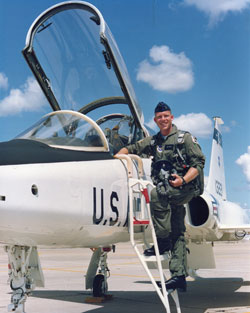
 |
Scott Anderson, of Duluth Minnesota, was a leader whose life exemplifies the value-based traits of leadership that inspired the establishment of this Foundation. Scott's qualities of leadership brought people together to achieve common goals, and empowered individuals to believe in themselves and to live a better life. Those he encountered were uplifted and challenged to make the most of their own gifts. |
 The impact Scott had on others was more than a gift, it was a trait nurtured by the way he made his choices in life. It was learned--molded by much thought about life, the course he would take, and the principles he would follow. His life modeled uncompromising adherence to these principles. Scott lived with intentionality built on character and integrity formed by Christian faith. He viewed life as a wonderful adventure with worthy goals to be pursued and enjoyed with humor. Seemingly insurmountable obstacles were simply problems to be solved by creative initiative on the way to a goal. Scott lived a life characterized by consistency, creativity, adventure, initiative, optimism, integrity, humor, joy and care for others.
The impact Scott had on others was more than a gift, it was a trait nurtured by the way he made his choices in life. It was learned--molded by much thought about life, the course he would take, and the principles he would follow. His life modeled uncompromising adherence to these principles. Scott lived with intentionality built on character and integrity formed by Christian faith. He viewed life as a wonderful adventure with worthy goals to be pursued and enjoyed with humor. Seemingly insurmountable obstacles were simply problems to be solved by creative initiative on the way to a goal. Scott lived a life characterized by consistency, creativity, adventure, initiative, optimism, integrity, humor, joy and care for others.
Scott died testing the Cirrus SR20, an airplane that represented new concepts in personal aircraft safety, design and production. His leadership, commitment and creative abilities were instrumental in the successful certification of the airplane and its revolutionary safety systems. His life epitomized the pursuit of goals that had great value to his community and country.
Scott was a gifted and talented young man who had accomplished more at age 33 than most do in an entire lifetime. He was an F-16 fighter pilot in the Air National Guard as well as a test pilot for Cirrus Design Corporation. He was an acclaimed canoe adventurer (Duluth to Hudson Bay), an award winning author of three books, and a musician. Scott's inventive ability and people skills surfaced wherever he was. As an undergraduate engineering student intern, Scott's persistence and determination as a member of Minnesota Power's Research and Development team earned him recognition as co-inventor on a U.S. patent. While a student at Stanford University, he led an undergraduate team that built a two-person submarine. He was a graduate of Duluth East High School and Stanford University, where he studied engineering and history.
Quote from last chapter of Scott's book, Distant Fires, about the canoe trip to Hudson Bay:
Life is the Pursuit, Not the Capture
"...Distant fires are around us everywhere. They do not burn just in the North. But in the lands, in the woods and among the lakes and the streams they are easier to see, easier to follow. Everywhere that dream is held and followed to its end, there the distant fires burn. Some only we can see. Others we share with many.We thought that we would find our fire at York Factory. For years it had burned there before us, always ahead, always beckoning. But distant fires are never reached. At best, it is possible to stand near their ashes, still warm. Looking up, you can see that the fires have moved on, burning brightly somewhere farther in the distance..."
--from Distant Fires